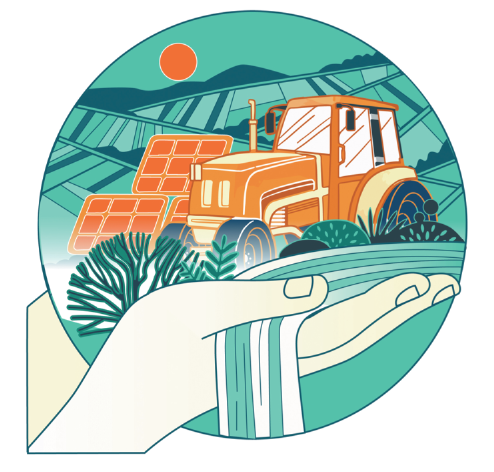Starved of succor


Growing hunger crisis highlights need for better global governance to ensure food security for all
In May 2022, the latest Global Report on Food Crisis released by the United Nations World Food Program shows that nearly 193 million people in 53 poor countries and regions around the world faced severe food insecurity in 2021, the highest number in six years, due to the impact of regional conflicts, economic shocks and extreme weather. The disruptions to the food supply chain caused by the outbreak of the Russia-Ukraine conflict and the resultant soaring prices have sharply exacerbated the food crisis, hitting less-developed regions such as Africa the hardest. In the WFP report, the Democratic Republic of the Congo, Afghanistan, Nigeria, Yemen, Ethiopia, South Sudan, Somalia, Sudan, Pakistan, Haiti, Niger and Kenya are listed as regions facing food security risk, with about 3 million people falling into famine in 2022.
The current global food security crisis highlights the vulnerabilities in the global food supply chain, food trade and food financial system, as well as the inequity and imbalance of global development, behind which are the huge agricultural subsidies of the United States and other developed economies and the distortion of the global food trade system. The global food crisis, coupled with the pandemic and debt crisis, has seriously set back global poverty reduction and global development, as a result of which there will be great difficulties to achieve the UN 2030 Agenda for Sustainable Development on schedule, requiring major economies to face up to persistent problems such as reform of the global agricultural trade system from the perspective of global development.
As the global geopolitical landscape changes, food security has become more transnational, diffuse and multilayered, which makes the challenges of food security governance even more complex. There are obvious needs for comprehensive governance to ensure food security, which calls for multilateralism in food security governance, and fair, just and inclusive global food security governance rules and institutions, along with effective leadership in the operation and development of food security governance mechanisms. The history of the food trade shows that the great powers have driven the emergence of food trade chains, but these are mainly dominated by the absolute national interests of a few developed countries, while the current international situation shows that international leadership for food security is in a chaotic situation. The food security governance mechanisms developed so far are still immature, and countries need to try their best to ensure that food security governance is carried out in an orderly manner through political negotiations and norm-setting. As a result, coalescing forces are seeking effective leadership to push food security governance mechanisms forward.
The COVID-19 pandemic and climate change have jointly impacted the governance resilience of food security. For China's participation in global food security governance, the imbalance between supply and demand not only brings shocks to China, but also comes with opportunities through which China can help improve the resilience of food security governance. Stable grain production gives China both the confidence and ability to participate in global food security governance and the basis for developing its own external food supply chains. Whether in Asia, Africa or European countries, China's grain exports have helped to ease the food shortage crisis to a certain extent, and also driven the economic chain development of China's foreign grain industry, serving both the domestic and foreign markets. Recently, China has actively led the dissemination of food cultivation technology to less-developed regions in Africa and other countries, helping the development of host countries' food economies through the establishment of multinational food and agriculture enterprises. From the perspective of institutional supply, the decentralization of food security governance platforms has provided more channels for China's participation, and the trend for multi-stakeholder co-governance has stimulated the participation of non-state actors in China's foreign food security governance practices. Under the pandemic, civil society organizations and other entities play an important role in food security risk response.
In September 2021, President Xi Jinping proposed the Global Development Initiative during the general debate of the 76th session of the United Nations General Assembly, with food security one of the eight key areas identified for cooperation. The proposal aims to ensure food security, free more people from the threat of hunger, and enable more countries and regions to increase their sustainable agricultural production capacity, and finally achieve common prosperity. China is one of the largest food producers and donors all around the world. Under President Xi's Global Development Initiative, China is strengthening cooperation with the UN system and South-South cooperation through the Belt and Road Initiative, and is working with the international community to address the global food crisis risk.
Considering the trend for reform of the global food security governance system, the following are possible paths for China to participate in the construction of it: First, China should actively promote the Global Development Initiative by participating in the North-South and South-South food security governance cooperation. Second, it is important for China to promote the establishment of a solid and effective regional mechanism to build a multilateral platform for inclusive food security governance based on regional consensus and gradually expand the scope of food security cooperation. Third, China should urge the US and other developed countries to shoulder their responsibilities under the United Nations and World Trade Organization frameworks. Last, breaking the food production knowledge and information barriers and constructing a big data-based transnational regulatory warning mechanism for food security would help prevent and mitigate cross-border food security problems. It is exigent for China and developing countries to actively promote the construction of agriculture knowledge data centers which can help strengthen developing countries' food security capabilities.
Yu Hongyuan is a professor at the Shanghai Institutes for International Studies. He Jing is a research assistant at the Shanghai Institutes for International Studies. The authors contributed this article to China Watch, a think tank powered by China Daily. The views do not necessarily reflect those of China Daily.
Contact the editor at editor@chinawatch.cn

































